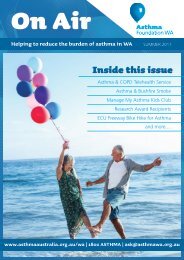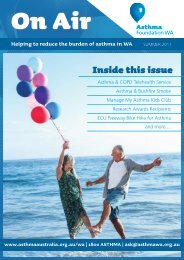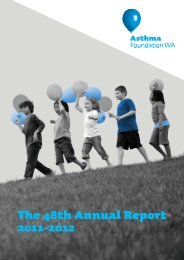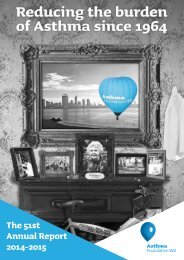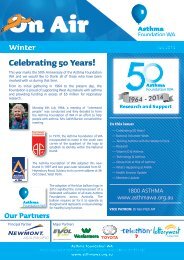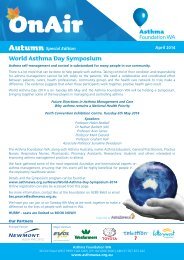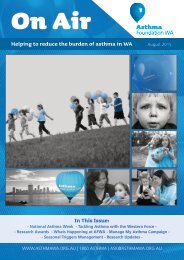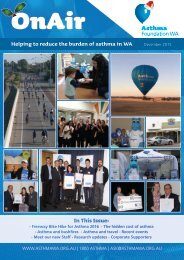OnAir Winter 2016
Asthma Foundation WA OnAir 2016
Asthma Foundation WA OnAir 2016
Create successful ePaper yourself
Turn your PDF publications into a flip-book with our unique Google optimized e-Paper software.
ASTHMA, THE<br />
FLU AND YOU<br />
Influenza, or the flu, is a highly contagious viral infection that infects the<br />
respiratory tract (nose, throat and lungs). It spreads easily from person to<br />
person through the air by coughing or sneezing, or by direct contact with the<br />
virus on hard surfaces or people’s hands. You can’t see it but it is there.<br />
Australian flu outbreaks are generally seasonal, occurring between May and<br />
September.<br />
Symptoms of flu can include:<br />
• High fever • Sore throat<br />
• Dry cough • Feeling unwell<br />
• Headache • Muscle and joint pain<br />
How will the flu impact asthma?<br />
The flu and other viral infections are the most common<br />
trigger for asthma flare-ups. People with asthma who<br />
contract influenza are at a higher risk of experiencing<br />
complications.<br />
These complications can include:<br />
• more severe asthma flare-ups,<br />
• pneumonia, bronchitis, ear infections,<br />
• days lost from work and school,<br />
• hospitalisation and even death.<br />
What can you do?<br />
The best way to protect yourself from the flu and<br />
spreading it to others is annual flu vaccination.<br />
The flu virus is constantly changing, so it is important<br />
to have the flu vaccine every year. It is best to be<br />
vaccinated in autumn so your body has time to protect<br />
itself before the flu season starts. This will ensure you<br />
and your family are protected against the most recent<br />
flu virus strains that may be around. The flu vaccine is<br />
recommended for everyone from six months of age.<br />
Everyone with asthma and their family members should<br />
be immunised against the flu.<br />
People who are most at risk of influenza and its<br />
complications can access the vaccine free under the<br />
National Immunisation Program. These are:<br />
• People aged 65 years and over<br />
• Aboriginal and Torres Strait Islander people aged six<br />
months to less than five years<br />
• Aboriginal and Torres Strait Islander people who are<br />
15 years and over<br />
• Pregnant women<br />
• People aged six months and over with medical<br />
conditions such as severe asthma<br />
Stop the spread of flu<br />
• Wash your hands regularly and properly with soap<br />
and water, particularly after touching your nose or<br />
mouth and before handling food<br />
• Sneeze and cough into tissues or your elbow, not<br />
directly into your hands, to prevent the spread of<br />
germs (Tissues should be thrown away immediately<br />
and hands washed)<br />
• Clean surfaces regularly, especially if someone has<br />
a viral illness<br />
• Do not share personal items<br />
• Try to avoid contact with infected people. If you<br />
can’t, then stand at least one metre away from the<br />
infected person and don’t stand directly opposite<br />
them<br />
• If unwell with flu-like symptoms it is advisable to<br />
stay at home to prevent the germs spreading in the<br />
workplace and the community<br />
Visit your GP for an asthma review to make sure<br />
you’re on the right medicines to manage your asthma,<br />
particularly your preventer and make sure your Asthma<br />
Action Plan is up to date. This will help you recognise<br />
and treat signs of worsening asthma symptoms.<br />
Speak with your GP or pharmacist for further<br />
information about asthma and the flu.<br />
Protect your family and friends who have asthma<br />
– get immunised against influenza.<br />
5




